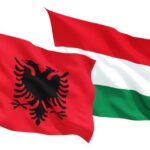Remembering U.S. leadership in Albania’s NATO membership and Kosovo’s independence
By ALBERT RAKIPI
In a trajectory of extreme ups and downs in relations between Albania and the United States, President George W. Bush’s visit to Albania in 2007 marked the highest point. In international relations, the visit of a president is always important and reflects a very high level of bilateral interstate relations. But if we take into account the asymmetry between a very small country like Albania and a global power like the United States, President Bush’s visit is quite significant and reflects a privileged relationship with Albania.
But what made the visit even more extraordinary, historic and decisive was the fact that it served to make public in Tirana the strategic decisions of the Bush Administration on the future of the Albanian people and the Albanian state: First, Kosovo’s independence and, second, Albania’s NATO membership.
Kosovo’s independence put an end to the dilemmas surrounding the Albanian national issue that stemmed from the recognition of the Albanian state with many Albanian territories left outside of it more than 100 years ago. And it is clear Kosovo’s independence would not have been possible without the determination of the United States and without the leadership of President George W. Bush.
NATO membership is undoubtedly the greatest achievement of modern Albania, the best thing to happen since the fall of the communist regime. NATO membership has strongly linked Albania’s present and future with the West. And no matter how deformed, long, with ups and downs the road to truly belonging to the West is — with its values of freedom, democracy, development and peace — NATO membership has not left any space or opportunity for dilemmas as to the destination. But Albania’s NATO membership too would not have been possible without the will of the United States and the leadership of President Bush.
Albanian diplomacy has had some specific times that have seen extraordinary achievements.
In June 2007, on his visit to Tirana, U.S. President Bush publicly announced Kosovo’s independence and Albania’s NATO membership.
In February 2008, Kosovo declared its independence. The United States, the main sponsor of that independence, was one of the first countries to recognize the new state in the Balkans.
In March 2008, Albania received an invitation to join NATO as a member.
In 2009, Albania joined NATO.
And in 2011, Albania achieved another extraordinary aspiration with the fall of the visa wall, which opened the opportunity for Albanians to freely visit most of Europe.
Basic characteristics of Albania-U.S. relations
The visit of President Bush in 2007 confirmed a basic characteristic of Albania-U.S. relations, however asymmetrical they are and will continue to be: The state of relations is continually important on issues of a strategic nature — even determining the destinies of the state and the nation.
Throughout the modern history of the Albanian state, relations with the United States have been either exclusive and privileged, or have not existed at all.
I believe this sounds almost mythical and totalitarian. It is true that the relations between Albania and the United States are mythical in a way in which no one has any dilemmas and the reviews are not useful, in fact might be prohibited, as in all mythological narratives.
However, today’s conference is a good opportunity to reflect on the necessity of democratization of the study of Albanian-U.S. relations and therefore the necessity of deconstructing myths. But as Aphthonius, an enlightened mind of antiquity put it: “Myths are lies that tell the truth.”
But what are some of the truths of the myth in Albania-U.S. relations?
President Woodrow Wilsonbecame a myth in the eyes and hearts of Albanians for his pro-Albanian intervention precisely when European powers were deciding the fate and future of an Albanian state. And, in fact, the Europeans were deciding against the existence of an Albanian state in the Balkans.
In 1945, the decision was made not to recognize the communist government that emerged from the Dec. 2 elections. The decision of Enver Hoxha’s communist government to remove the U.S. diplomatic mission in Tirana in the autumn of 1946, creating a shocking situation, was the final step to end relations with the West in the most absurd and obscure way.
In 1991, the United States made the restoration of diplomatic relations conditional on the recognition and presence of the Democratic opposition.
From 1992 onward, Albania supported the transformation toward a democratic system in its international relations and its national security in relations with the West and NATO, a path led by the United States.
From Ahtisaari Plan to “the time is now”
But Kosovo’s independence is undoubtedly the best case to witness the basic characteristics of Albanian-American relations, which, when they existed, had to do with fundamental things for the nation and state and their progress.
The United States led an international coalition against the Milosevic regime in Serbia, ending the war, the horrors of which were very similar to those of World War II.
It was very important that all European Powers, including important powers such as France, had to overcome the fact that Serbia, as President Miteran said, had stood by its side in two world conflicts.
But the end of the war in international relations does not necessarily mean the triumph and establishment of peace.
Eight years after the end of the war in Kosovo, the negotiations between Serbia and Kosovo had not produced any results and the temporary peace was expected to turn into a new conflict.
In April 2007, Special Envoy of the United Nations Martti Ahtisaari presented the plan for resolving the status of Kosovo.
The truth is that the Ahtisaari Plan contained the perspective of independence, but of course, to implement that plan, there was the need for political will in an unfavorable environment in the UN Security Council, but also some lack of enthusiasm among European allies.
We just have to speculate today what would have happened and what course the events would have taken and what would have been the fate of Kosovo and the future of its state and independence if the Ahtisaari Plan had not been accepted.
But the fact is that in less than a year, on Feb. 17, 2008, Kosovo declared independence based on the Ahtisaari Plan.
And the implementation of the Ahtisaari Plan, in fact the independence of Kosovo itself became possible with the will and leadership of the United States and President Bush.
“The end result is independence … and the time is now,” President Bush told foreign and local journalists in Tirana on June 10, 2007.
President Bush publicly rejected in Tirana the idea of an endless dialogue between Serbia and Kosovo, which in fact maintained a dangerous status quo.
In a way, Washington gently rejected the proposal of a European power to reflect on the future and status of Kosovo at least for a period of six months.
Again, we would speculate if he would try to give an answer to the question of what would have happened if this six-month reflection period could have been accepted by Washington.
And if this proposal was accepted, what security would there be that another European power could not make a similar proposal.
But the rejection of what President Bush still called “endless dialogue,” ,was not only for the opponents of Kosovo’s independence, but also for the non-opponents and democratic countries and states that were still hesitant for one reason or another.
The United States put an end to these hesitations by announcing the international recognition of the new state.
Finally, the commemoration of President Bush’s visit 15 years ago is an opportunity to reflect on the role the United States played in addressing a number of issues related to peace, security and reconciliation in the Balkans.
The determination of the United States and the strategic vision of President Bush gave an end to the status quo in Kosovo.
But regardless of the developments, the growth and strengthening of the state of Kosovo, the international recognitions, the frozen conflict between Serbia and Kosovo still continues in the Balkans.
The United States and EU member states support the dialogue between Kosovo and Serbia. This is the second period of dialogue between Serbia and Kosovo in more than two decades.
The first period of the “dialogue between Serbia and Kosovo” was the one that began immediately after the end of the war in 1999, which President Bush called an “endless dialogue.”
And as we saw, it was the United States and its President who put an end to this endless dialogue in 2007 in Tirana by announcing the independence of Kosovo.
This is the second period of dialogue hosted by the European Union that continues to develop for more than a decade. And what is the substance of the current negotiations between Kosovo and Serbia? The issue of car license plates. In the words of Veton Surroi, think if almost 25 years after the end of WWII, two great enemies, Germany and France, continued to talk about vehicle license plates.
The question today then is: Will the United States act for a second time to end an absurd and endless dialogue like it did in 2007 and finally lead to a solution of the frozen conflict?
*This article adapted from remarks of Albert Rakipi at a conference by the Council of Albanian Ambassadors, with the support of the Council of American Ambassadors, “The first historic visit of an American President to Albania,” in the framework of the celebrations of the 100th anniversary of the establishment of U.S.-Albania diplomatic relations.
The author is Chairman of the Albanian Institute for International Studies ( AIIS)







